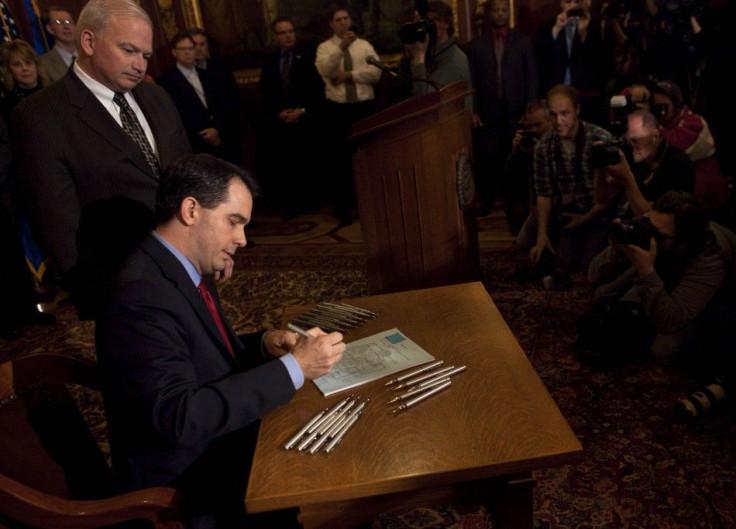Wisconsin Recall Tuesday Mirrors National Fight On Unions

The most expensive election in Wisconsin's history will culminate tomorrow with voters deciding whether to reject or embrace Republican Gov. Scott Walker's drive to invigorate the state's economy by undercutting public unions.
Propelled into office during the Republican-wave election of 2010, Walker threw his weight behind a deeply divisive bill that severely weakened collective bargaining rights for most public unions. Raucous protesters surged into the statehouse in Madison, and a group of Democratic senators fled the state in an effort to prevent a vote, but Republican senators pushed the legislation through with a controversial procedural maneuver.
Walker claimed the bill's passage as a key victory, but the political fallout could cost him his job. Recall elections last summer claimed two Republican state senators and narrowed the party's Senate majority, and Walker's opponents subsequently gathered more than twice the number of signatures necessary to force an election to recall the governor.
The election looks likely to be a close one, with a poll released Monday giving Walker a narrow three-point edge. Members of both parties are treating the contest as a gauge of public support for the deficit-focused Republican party's drive to make limiting union power an essential element of holding down costs.
This recall will be taken as a proxy for the bigger controversy over the role of public employee unions, said Kenneth Mayer, a political science professor at the University of Wisconsin. If Walker is not recalled, then it will be an encouragement to other groups and other governors who see restraining the power of public employees unions as essential to the long-term fiscal health of states, and if Walker is recalled then that will be read by unions and their supporters -- particularly public employee unions, which are the only significant area of union growth -- as a sign that the unions still retain significant political clout.
An unprecedented avalanche of money -- much of it from outside of the state -- has underscored how the Wisconsin recall has become a national priority. Both parties have deployed top surrogates to campaign: governors Chris Christie of New Jersey and Bobby Jindal of Louisiana on the Republican side, and former President Bill Clinton in support of Barrett.
These are national interests with a national agenda, and they see Wisconsin as a domino that could knock over a lot of other dominoes and they want to make sure Wisconsin falls in a way that favors them, said Mike McCabe, executive director of the watchdog organization the Wisconsin Democracy Campaign. Our state's kind of a pawn on a national chessboard, and that's something we're not accustomed to here.
The Wisconsin Senate recall elections of last summer offered a preview of the challenge to Walker, attracting an unprecedented $43.9 million across races targeting six Republicans and three Democrats.
The Walker recall has shattered that record. Individuals, outside groups and party organizations have poured more than $60 million into the race since November of 2011, underscoring the importance of an election that has garnered national scrutiny.
Walker has vastly outspent his opponent, Milwaukee Mayor Tom Barrett, pulling in over $30 million in direct contributions and spending about $29 million compared to Barrett's approximately $2.9 million. While Barrett pulled in about $3.1 million between April 24 and May 1, an astonishing number for such a short period, Walker has had the twin advantages of more time (Barrett won the Democratic primary in May) and a Wisconsin law allowing elected officials facing recalls to raise unlimited funds for a certain period.
That spurred an influx of huge donations from prominent Republican backers like Nevada casino magnate Sheldon Adelson and Texas home builder Bob Perry. Of the $13.2 million Walker has pulled in since the start of 2012, nearly two-thirds has come from out-of-state donors.
A little over a quarter of Barrett's donors are located outside Wisconsin, although unions have flexed their muscle in the effort to unseat him: Wisconsin for Falk, a group supporting Barrett's Democratic primary challenger and former Dane County Executive Kathleen Falk, pulled in $4.5 million almost entirely from unions, with about a third of the total coming from out of state.
And then there are the third-party organizations. The Wisconsin Democracy Campaign estimates that entities not contributing directly to a candidate -- political action committees and counterparts to Super PACs called 1.91 groups -- have deployed about $23 million. Less easy to track are organizations that skirt disclosure requirements by running issue ads that do not explicitly back a candidate: the Wisconsin Democracy Campaign pegs their spending at about $8.4 million.
© Copyright IBTimes 2024. All rights reserved.











